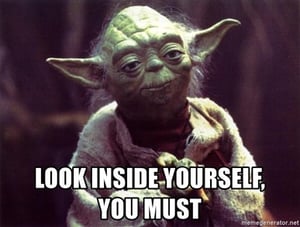
“Always remember that when you’re pointing your finger at someone, you’ve got three pointing back at yourself.”
This is an adage I can vividly remember hearing at a young age, repeatedly. One time in particular, we were standing in line at the Kroger – my brother, mom, and myself – and mom was once again teaching me not to stare and point at the other patrons standing around us. Apparently, I had quite the tendency to do so, and it’s clear my boys have inherited that from me as well. It’s a good thing mom had to teach me this lesson so much; I have many moments from which to draw on to now be the teacher.
At that age, I was doing it either from incredulity or curiosity. It was my way of making known that my eyes were perceiving something I was shocked by, confused by, or that I thought was really neat. Although I can’t remember my words that accompanied these moments, I’m sure I was saying something akin to, “LOOK at them! Why are they DOING that? Why are they wearing THAT?” The innocence existed in these outbursts, but nonetheless, mom was teaching me manners and respect for others.
Fast forward more than a few years, and I recognize the same bent towards finger-pointing in myself and in those all around me, all the time. Whether in our personal or professional interactions, when we are faced with confrontation, it’s often our first quiet instinct to find someone to blame. Likewise, when we are faced with an uncomfortable truth, it’s often that same first quiet instinct to think of 5 people besides ourselves that could really stand to hear that truth. … “Always remember that when you’re pointing your finger at someone, you’ve got three pointing back at yourself.” …
How many problems actually get solved when a group of coworkers sits in a room, collectively pointing fingers at someone else around the table? Perhaps they are doing so with their sharp words, or perhaps they really are waving their finger in the direction of whoever they see fit to blame for the issue at hand. Is it more constructive to think about who to blame or how to solve the issue? Have I stopped to consider how I might be contributing to the issue as well? Have I considered the three fingers pointing back at myself? Am I helping reach a solution or am I hurting others by assuming motives and jumping to conclusions?

The most important point I want to make here is that we must always first look within before we look around. If we will adopt introspection as a common habit, we will often find ourselves face to face with a treasure trove of our own shortcomings to deal with. Chances are, we won’t have time to blame others if we are busy doing our own inner work. Our relationships will thank us if we will only spend less time trying to find fault in everyone else and more time examining our own motives, intentions, and opportunities for change and growth.



